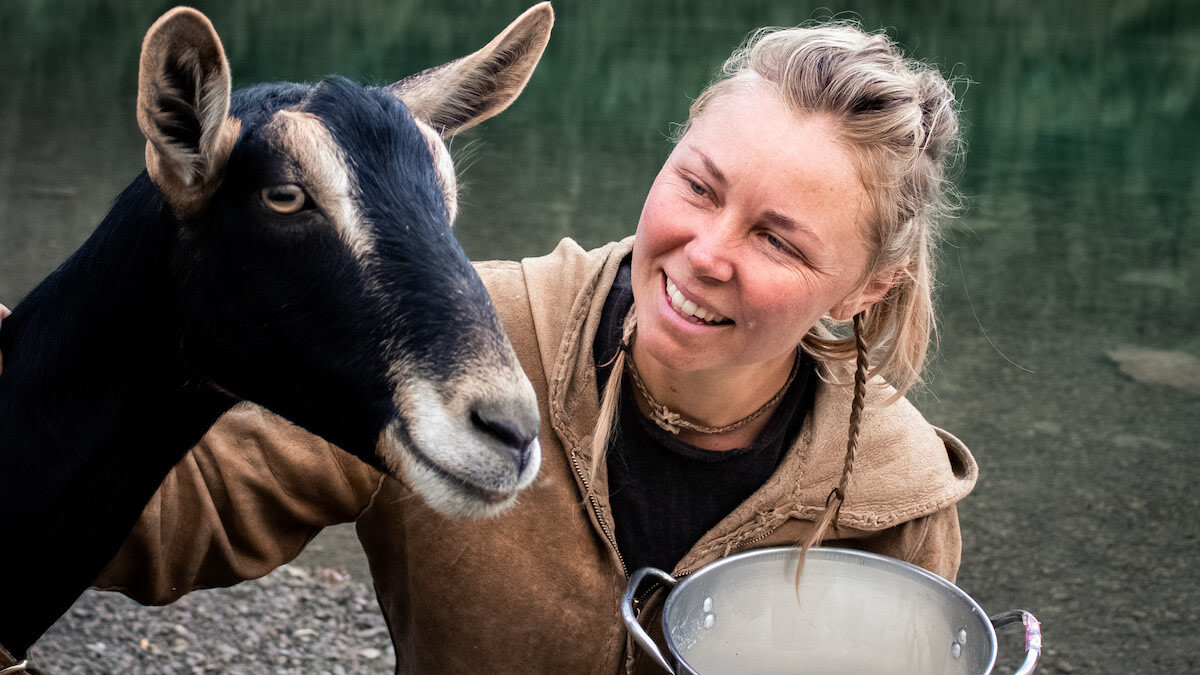Home>Ideas and Tips>A Beginner’s Guide To Raising Goats


Ideas and Tips
A Beginner’s Guide To Raising Goats
Published: November 1, 2024
Learn the essentials of raising goats, from choosing the right breed to providing proper care, housing, and nutrition. Perfect for beginners!
(Many of the links in this article redirect to a specific reviewed product. Your purchase of these products through affiliate links helps to generate commission for Storables.com, at no extra cost. Learn more)
Raising goats can be a rewarding and profitable venture, whether you're looking to start a small homestead or expand your livestock operations. However, it's essential to approach this endeavor with careful planning and a thorough understanding of the needs of these social and intelligent animals. In this guide, we'll cover the basics of raising goats, including choosing the right breed, providing proper housing and fencing, managing their diet, and ensuring their health.
Choosing the Right Breed
One of the first steps in raising goats is selecting the right breed. There are several types of goats, each with its own unique characteristics and uses. Here are some of the most common breeds:
Dairy Goats
If you're interested in raising goats for milk production, dairy breeds are the way to go. Some popular dairy breeds include:
- Nubian Goats: Known for their distinctive Roman noses and high milk production, Nubian goats are a popular choice for dairy farmers.
- LaMancha Goats: These goats are known for their high milk production and are often used in commercial dairy operations.
- Alpine Goats: Alpine goats are another popular dairy breed, known for their high milk production and friendly temperament.
Meat Goats
If you're interested in raising goats for meat, meat breeds are the better option. Some popular meat breeds include:
- Boer Goats: Boer goats are one of the most popular meat breeds due to their fast growth rate and high-quality meat.
- Kiko Goats: Kiko goats are known for their hardiness and ability to thrive in a variety of environments, making them an excellent choice for small farms.
- Savannah Goats: Savannah goats are another popular meat breed, known for their fast growth rate and high-quality meat.
Pet Goats
If you're looking to raise goats as pets, you can choose any breed that suits your needs. However, it's important to remember that goats are social animals and need companionship. A single goat can become lonely and stressed if left alone for extended periods.
Housing and Fencing
Proper housing and fencing are crucial for the health and well-being of your goats. Here are some tips for setting up a suitable environment:
Read more: A Beginner’s Guide To Minimalist Living
Housing
Goats need adequate shelter from the elements and protection from predators. Here are some tips for building a suitable shelter:
- Size: The shelter should be large enough to accommodate all your goats comfortably. A general rule of thumb is to provide at least 15 feet of open space per goat.
- Materials: You can use wood, metal, or even recycled materials to build the shelter. Make sure it's sturdy and can withstand harsh weather conditions.
- Ventilation: Ensure good ventilation in the shelter to keep the air fresh and prevent ammonia buildup from urine.
- Bedding: Provide a comfortable bedding material like straw or hay to keep the goats dry and warm.
Fencing
Fencing is essential to keep your goats safe and prevent them from escaping or getting into trouble. Here are some tips for setting up effective fencing:
- Type of Fencing: You can use wire mesh fencing, wooden fencing, or even electric fencing. Electric fencing is particularly effective as it can be adjusted to different heights and can be used to create a perimeter around the entire property.
- Height: The fence should be at least 4 feet high to prevent your goats from jumping over it.
- Gates: Make sure the gates are sturdy and can be locked securely to prevent escape.
- Maintenance: Regularly inspect the fencing for any damage or weaknesses and make repairs as needed.
Diet and Nutrition
Goats are ruminants and require a diet rich in fiber and nutrients to stay healthy. Here are some tips for managing their diet:
Hay
Hay is an essential part of a goat's diet. You can use various types of hay like alfalfa, clover, or timothy hay. Here are some tips for feeding hay:
- Quality: Choose high-quality hay that is free from mold and pesticides.
- Quantity: Provide enough hay for all your goats to eat comfortably. A general rule of thumb is to provide about 1-2% of their body weight in hay per day.
- Feeding: Use hay feeders to keep the hay clean and dry. You can also make your own hay feeders using wooden crates or plastic containers.
Grains
Grains are not essential for goats but can be used as supplements during certain times of the year or for specific needs like milk production. Here are some tips for feeding grains:
- Type: Use grains specifically formulated for goats, which contain essential nutrients like copper.
- Quantity: Start with small amounts (about 2-3 cups per day) and adjust as needed based on milk production or overall health.
- Feeding: Feed grains in small amounts to prevent bloating and other digestive issues.
Minerals
Minerals are crucial for maintaining the health of your goats. Here are some tips for providing minerals:
- Type: Use mineral mixes specifically formulated for goats, which contain essential minerals like copper and salt.
- Quantity: Provide about 1 cup of minerals per goat per day.
- Feeding: Offer minerals free-choice, meaning they should be available at all times.
Health and Hygiene
Maintaining the health and hygiene of your goats is crucial for their well-being and productivity. Here are some tips for ensuring their health:
Hoof Care
Goats need regular hoof care to prevent overgrowth and related issues. Here are some tips for hoof care:
- Trimming: Trim the hooves regularly using specialized tools.
- Rough Surfaces: Provide rough surfaces like rocks or concrete blocks for them to walk on, which helps keep the hooves trimmed naturally.
Read more: A Beginner’s Guide To Indoor Herb Gardening
Vaccinations
Vaccinations are essential for protecting your goats from diseases. Here are some tips for vaccinations:
- Schedule: Follow a vaccination schedule recommended by your veterinarian.
- Types: Use vaccinations specifically formulated for goats, which protect against diseases like pneumonia and tetanus.
Regular Check-Ups
Regular check-ups with a veterinarian are crucial for maintaining the health of your goats. Here are some tips for regular check-ups:
- Frequency: Schedule regular check-ups every 6-12 months.
- Monitoring: Monitor their overall health, including their coat condition, weight, and any signs of illness.
Breeding and Reproduction
If you're planning to raise goats for meat or dairy production, understanding breeding and reproduction is essential. Here are some tips for breeding and reproduction:
Breeding
Breeding goats requires careful planning and management to ensure healthy offspring. Here are some tips for breeding:
- Bucks vs Does: Use bucks (male goats) for breeding does (female goats). A single buck can be used with multiple does.
- Age: Ensure both bucks and does are at least one year old before breeding.
- Health: Ensure both bucks and does are healthy before breeding.
Pregnancy and Birth
Pregnancy and birth are critical stages in the life cycle of goats. Here are some tips for managing these stages:
- Pregnancy: Monitor does closely during pregnancy to ensure they remain healthy.
- Birth: Assist with births if necessary, especially if it's your first time raising goats.
Marketing and Sales
If you're planning to sell your goats, understanding marketing and sales strategies is crucial for maximizing profits. Here are some tips for marketing and sales:
Direct Sales
Direct sales involve selling goats directly to consumers or other farmers. Here are some tips for direct sales:
- Networking: Build relationships with potential buyers through networking events or online platforms.
- Quality: Ensure you're selling high-quality goats that meet the needs of buyers.
Auctions
Auctions involve selling goats through public auctions where multiple buyers bid on the animals. Here are some tips for auctions:
- Preparation: Prepare your goats well before the auction by ensuring they are healthy and well-fed.
- Marketing: Market your goats effectively through advertisements and promotional materials.
Conclusion
Raising goats can be a rewarding and profitable venture if done correctly. By choosing the right breed, providing proper housing and fencing, managing their diet, ensuring their health, and understanding breeding and reproduction, you can successfully raise goats for dairy or meat production. Additionally, understanding marketing and sales strategies will help you maximize profits from your goat farm. Remember to always seek advice from veterinarians and experienced farmers to ensure you're providing the best possible care for your goats.
Additional Tips
- Start Small: If you're new to raising goats, start with a small herd to gain experience and build confidence.
- Research Local Regulations: Familiarize yourself with local regulations regarding livestock farming, including zoning laws and health requirements.
- Join Goat Communities: Joining goat communities or online forums can provide valuable insights and support from experienced goat farmers.
- Be Patient: Raising goats requires patience and dedication. Be prepared to face challenges and learn from them.
By following these guidelines and tips, you'll be well on your way to successfully raising goats for dairy or meat production. Happy farming
Was this page helpful?
At Storables.com, we guarantee accurate and reliable information. Our content, validated by Expert Board Contributors, is crafted following stringent Editorial Policies. We're committed to providing you with well-researched, expert-backed insights for all your informational needs.











0 thoughts on “A Beginner’s Guide To Raising Goats”